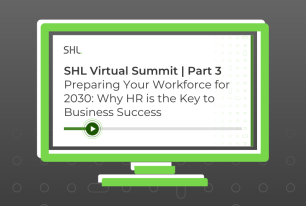6 Priorities for Shaping a Flourishing World of Work
Learn six ways you can prepare your organization to face the opportunities and challenges in the new world of work.
Share
Take a step back and you can clearly see the world spinning. Big, global, scary forces impact our lives every day. Many events few predicted and most never even considered—a global pandemic, the war in Ukraine—yet these have shaped our experiences and priorities.
Employees have made it clear what they are looking for—flexibility, meaning, and a sense of security and belonging. To stay ahead, employers understand they must adapt to the changing needs of their employees and recognize that a new contract and model for organizations is critical, they do not yet know how.
And, whilst employees continue to hold the chips as time and place are no longer prerequisites for jobs, our own research shows the majority of knowledge-workers have re-focused their motivators on the foundations of security, pay, flex for life and work, in purpose-led organizations, over-ambitious projects and goals in risky ventures.
With both employers and employees busy trying to work out how to survive each day, it can be difficult to lift our heads and plan the best next step.
As 2023 edges closer, how do we step from reactive toward proactive? Which trends are here to stay and which is just a fad? How can people and organizations get in a position to flourish in a new era of work?
Understanding market forces
Identifying the macro factors shaping our work and lives today offers a helpful vantage point.
Long before the word ‘pandemic’ was even uttered, we were witnessing big demographic and technological changes. In many parts of the world, birth rates are declining, and people are living longer. Financially supporting a 100-year life is now a genuine reality. Multi-chaptered careers are fast becoming a necessity to sustain healthy, meaningful lives and for employers, engaging and developing workforces with four generations working together, often at different career stages, is an everyday reality.
Consequently, across multiple sectors, a talent crisis looms—there simply are not enough skilled people for roles—and employers are having to become more creative in acquiring talent and designing future-proof talent management processes.
Technology continues to reshape how, where, and who we work with. Working on shared documents, interacting virtually across time zones and cultures, and collating data on everything, is our everyday norm. Finding the optimal blend between automated technology and human emotion and interpretation to enhance productivity is our next challenge.
Today, organizations are live ecosystems with new roles, new teams, and functions constantly emerging. Employers must find ways to align their people with the opportunities (skills, projects, roles, teams) to deliver value and maintain relevance in a market where industries converge. A new taxonomy is emerging—skills and projects over roles and qualifications—enabling agile evolution and exploration of different and diverse talent pools (within and outside organizations).
To stay ahead, employers understand they must adapt to the changing needs of their employees and recognize that a new contract and model for organizations is critical, they do not yet know how.
Architecting a flourishing world of work
Our experience of a VUCA world has come into sharp focus. Now, we are entering another phase many are referring to as BANI (Brittle, Anxious, Non-Linear, and Incomprehensible). This new era is characterized by the interconnections we feel as globally linked and digital societies. Ripples are felt across the world in job markets, talent pools, supply chains, cost of living, essential services, communities, and families. And—we are all glued to our phones, scouring social media and news stories to ensure we feel one step ahead and avoid the shame of FOMO.
Stepping back, to re-focus on the outcomes we wish to achieve and ensuring these encompass both tangible, i.e. commercial success, and intangible, i.e. maintaining productivity, having the capacity to transform, and nurturing happy, healthy, inclusive communities is a crucial starting point.
A door is beginning to open on a new chapter in the world of work—now it is up to us to shape it.
Here are 6 ways you can prepare your people and organization for success in a new world of work:
- Deconstruct jobs into skills and projects
Breaking down jobs into skills and experiences so we can put them back together in the optimal way to deliver critical outcomes in ever-changing contexts is a critical step. The WEF suggests a skills shortage crisis is only a few years away—having frameworks and technology enabling anticipation, identification, and matching of individuals to key tasks, projects, and teams will prove essential. - Understand everyone’s potential
Switch your lens from top talent only, to everyone who has potential. Businesses that stay ahead in the game of remaining relevant will have their finger on the pulse of objectively understanding whose got potential. Who could learn a new skill? Who could deliver a critical business transformation project successfully? Who will thrive in an environment of uncertainty? Very often, the next right answer lies in front of you, you just have not seen the potential, yet. - Unleash the power of people managers
The old model of managers as supervisors and providers of tasks and deadlines is no longer fit for purpose. Good management is shifting to empowering, coaching, personalizing (jobs, interactions, experiences), and empathetically supporting a whole person, with life outside of work. Understanding and nurturing a team, across countries, cultures, and in hybrid settings, is often under-valued and yet can make or break a business. - Ensure your culture is (and remains) an asset
Employees are now more likely to judge a workplace on its culture than the salary they are paid. Culture creates happiness and loyalty through experiences, forging friendships, enabling feelings of inclusion and belonging, and if set up and managed as an asset, can fuel productivity, innovation, and growth. Employees expect organizations to be purpose-led and this creates the foundation for psychologically safe, constructive, and fair environments in which to work and thrive. Make sure your culture is an asset. - Put employees in the driving seat
Employees want and can access, flexible approaches to work. Embrace hybrid, it is here to stay and could become a catalyst for sustaining longer, multi-chaptered working lives. Understanding people as individuals, personalizing experiences, connecting stages in the employee journey (e.g., hiring through to onboarding), and providing access and time to learn in the flow of work will provide quick returns in a motivated, agile, and skilled workforce. Are you empowering your teams to own their careers? - Prioritize talent intelligence
Finally, a race begins to design talent systems enabling organizational agility through harnessing the collective power of human potential. Capturing objective people insight on skills, motivation, and potential, as well as data such as engagement, performance, and customer impact will enable organizations to confidently connect the dots and curate seamless employee experiences as well as mobilize growth-focused teams.
The old model of managers as supervisors and providers of tasks and deadlines is no longer fit for purpose.
In organizations, especially those working in HR or people leadership, 2022 brought a constant stream of novel challenges and scenarios. The Great Resignation and rush to re-write ‘hybrid’ work policies made way to quiet quitting and career cushioning and more recently productivity paranoia swept across businesses as frustrations with ongoing economic turbulence grew. Align what is valuable to your employees with value creation for your business, and you will have a long-term recipe for success.
Check out our resources for more insightful tips that help you shape the world of work in 2023! Contact us to learn more about how we can help you.










